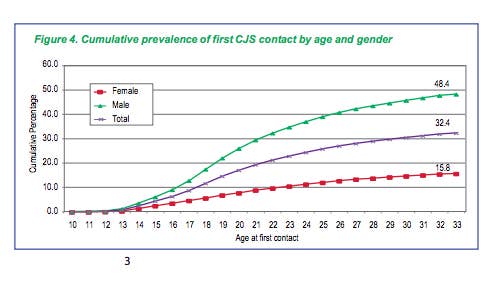Nearly half (48.4%) of all men in NSW born in 1984 have had some form of action taken against them by the NSW police, new figures released by the state's Bureau of Crime Statistics and Research reveal.

The actions include either being formally cautioned by police, including for possessing cannabis; being referred to a youth justice conference; or being charged with an offence and taken to court.
About 1 in 6 women (15.8%) and more than a third (35.5%) of the Aboriginal population born in 1984 have been proceeded against in one of these ways over the last 23 years.
The most common form of police contact was being taken to court for a driving offence, including drink driving and driving while disqualified.
The bureau's executive director Don Weatherburn said if you took driving offences – "not speeding but drink driving or driving without a license" – out of the equation then it was closer to 32% of men of that age who had connected with the criminal justice system.
"This group is a fairly crime-prone one compared to others, because they grew up in the '90s and turned 10 in 1994, just as the heroin epidemic was really revving up," he told BuzzFeed News.
"They also hit their teenage years when we were having a consumer boom in electronic goods, which were great to steal and sell, and those were the days you could sell anything down at the pub, whether it was a colour TV, a laptop, or a pair of Reeboks."
One of the most powerful predictors of the number of contacts with the criminal justice system was the age of first contact.
"BOCSAR also found a surprisingly high proportion of those born in 1984 had also served time in prison," the bureau said in a statement.
"The percentages of males, females and Aboriginal Australians born in 1984 who have received a custodial penalty over the preceding 23 years were 4.2%, 0.5% and 13.2%, respectively."
Those aged under 15 at their first contact reappeared in court 7.5 times more often than those whose first contact occurred when they were 25 years or older, the research found.
"Those who start offending when they are young, however, account for a very large share of all criminal court appearances and imprisonments," Weatherburn said.
"That is why early intervention to reduce the risk of further offending is so important."
